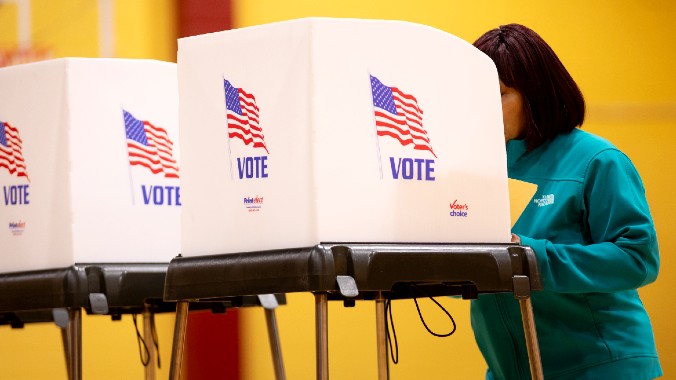Following Abortion Ballot Measure Efforts? You Should Follow State Legislature Races Too
Over a dozen states with abortion bans in place require that state legislatures introduce abortion-related ballot measures. And in states where abortion rights measures have passed, Republican-controlled legislatures continue to undermine them, new research shows.
Photo: Shutterstock AbortionPolitics
Since 2022, one thing has been abundantly clear: The right to abortion is popular, and forced pregnancy and birth by way of abortion bans is not. Abortion has fundamentally shaped every post-Dobbs election that’s taken place thus far, including helping a Democrat win the governor’s race in Kentucky. And of the half dozen states that have voted directly on abortion-related ballot measures since Dobbs, reproductive rights have won—even in states like Ohio and Montana.
This election cycle, about a dozen states are trying to get abortion rights measures on the ballot or have successfully gotten their proposals to qualify for the ballot come November. Each of these measures—in states including Missouri, Arizona, Florida, and South Dakota—presents an exciting opportunity to reverse an abortion ban that’s in place or solidly protect abortion rights from future bans. But if you’re following any of these measures, a new research memo shared by the Democratic Legislative Campaign Committee highlights that it’s just as important to follow state legislative races this cycle.
Control of state legislatures is necessary to allow successful abortion rights measures to fully take effect after elections. DLCC President Heather Williams told Jezebel it’s “great that abortion ballot measures are getting this attention.” But they should underscore that “reproductive freedoms are first and foremost being decided in the states and in state legislatures—that’s where we need to continue to build power to really protect these rights.”
The DLCC’s research cites a report from the Kaiser Family Foundation published earlier this year, which shows that in 15 of the 25 states that have abortion bans, only the state legislature can put abortion-related ballot measures directly to the electorate. These states include Idaho, Texas, Louisiana, Mississippi, Georgia, Alabama, South Carolina, North Carolina, Tennessee, Kentucky, Indiana, and West Virginia. (Wyoming, Utah, and Iowa also require abortion-related ballot measures to be introduced by the state legislature, but their abortion bans are currently temporarily blocked in court, KFF notes.) In these states, Democratic-controlled legislatures are essential to put abortion rights measures to a vote.
-

-

-

-

-

-

-

-

-

-

-

-

-

-

-

-

-

-

-

-

-

-

-

-

-

-

-

-

-

-

-

-

-

-

-

-

-

-

-

-








































